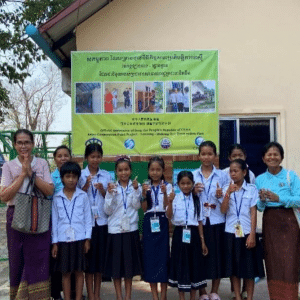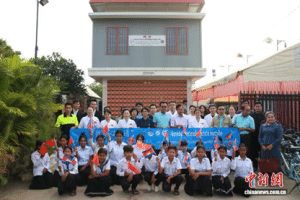
A Lian was held captive in a mountainous area in Southern Jiangxi Province for one year after her wedding in February 2016. During this period she was constantly raped, beaten and insulted by her husband, even while she was pregnant.
“He wouldn’t give me any clothes to wear, forced me to eat expired food, beat me if I couldn’t finish the food, and even urinated on me” says A Lian, a 25 year-old woman whose life was completely ruined after she was made to marry a local gangster under his threats and family pressure.
Domestic violence is endemic in China. According to research from people.cn, in 2016 25% of Chinese households have seen domestic abuse and 90% of the victims were women. Data from the National Women’s Federation in 2013 also suggests that one in four married women have experienced domestic violence.
For a very long time, there was an absence of laws that could bring justice into the household. While beating a stranger to death is a serious crime that could lead to the death penalty, this didn’t apply to cases between married couples. By way of example, in 2009 27 year-old Wang Guangyu was imprisoned for only six and a half years for beating his 26 year-old wife Dong Shanshan to death.
It was not until the entering into force of the national Anti-Domestic Violence Law in March 2016, due in part to 20 years of continuing efforts from feminist groups, NGOs for women’s rights and experts, that things finally showed an upturn.
“The law offers a legal basis for our anti-domestic violence work. It marks a milestone in the battle against domestic abuse. The mechanisms, which include written reprimands, mandatory reports and restraining orders, expand the channels and scale of protection, and clarify the responsibilities of all the stakeholders” explains Li Ying, Director of the Beijing Yuanzhong Gender Development Center, an NGO that provides social assistance and legal aid to gender-based violence victims since 2011, acknowledging the great influence of the piece of legislation.
Li Meng, Director of the Shenzhen Pengxing Domestic Violence Protection Center, a social organization specialized in domestic violence aid since 2009, feels the same way: “We now hear much less questioning voices when communicating with the public and government agencies.”
However, according to a report monitoring the implementation of China’s first Anti-Domestic Violence Law from March 2016 to October 2017, released by women’s rights NGO Beijing Equality on November 28 to mark UN Women’s 16 days of activism campaign against gender-based violence, the implementation of the law is not yet satisfactory.
Three months after the launching of the Anti-Domestic Violence Law, A Lian found a chance to flee and walked a long way through the mountains to look for the help of the local Women’s Federation. “They said I should either just tolerate him and live my life, or else have an abortion and then send my relatives to teach him a good lesson. Then they gave me some anti-domestic violence material and asked me to show him”, A Lian told China Development Brief.
The distribution of written reprimands and restraining orders is far from enough. According to the monitoring report, restraining orders were issued for less than 20% of applications, yet their withdrawal rate reached 30%. Some courts prefer to spend time mediating rather than issuing restraining orders. “After active legal education and the judicial mediation of the (Shanghai) courts, some perpetrators have promised to no longer use violence and the victims in 37 cases have voluntarily withdrawn their applications for restraining orders”, reported the Shanghai Law Journal. But according to Li Meng, violence cannot be mediated. “Mediation means that both sides compromise to achieve an agreement. We should let the perpetrator bear the consequences of violence rather than asking the victim to step back”, the activist says firmly.
Local news suggests that up until November 2016, in Dezhou, a city located in northwestern Shandong, police received 238 reports of domestic violence and only two written reprimands were issued.
After finding out about the mechanism of issuing written reprimands, A Lian asked the police for one, but an officer said that he had never heard of it. When she insisted, the officer replied in a tough tone: “whether I issue it or not, I don’t need you to guide my work.”
“The law is a good start but there is no detailed regulation to guide the implementation, which might lead to disputes in practice. The dearth of training sessions for law enforcement officers is another reason”, says Li Ying. “Crucially, it’s the lack of awareness of domestic violence.”
In China, domestic violence is often viewed as a private matter. With the passing of the Anti-Domestic Violence Law, this mindset has gradually begun to sway. It can be seen from the above-mentioned report that more stakeholders and individuals are starting to actively exercise their duties under the law so as to stop ongoing domestic violence. “We now see more domestic violence cases being revealed and reported by the media,” said Li Ying, “and this is a good thing.”
Yet the situation remains to be improved. In the case of A Lian, when she first told her parents and friends that her husband had raped her, no one stepped in. She has also called the police dozens of times since May 2016, but what they did every time was merely write down her personal information and file it as a normal family dispute, telling her to either live with it or divorce. “Domestic violence is about power control”, says Li Ying. Even if the two split, there’s no guarantee that violent acts will end as well. “They say the victims will usually go back to the perpetrator for seven times before they leave for good”, she adds.
From this point of view, the traditional gender ideology in Chinese culture that views women as subordinate to men does no good. What’s more this cultural baggage just refuses go away. Earlier this month in Fushun, northern Liaoning, a so-called “feminine virtues workshop” took place, including such grotesque patriarchal platitudes as “women who order take-away food go against feminine virtues”, “a woman should speak less, work more, and close her mouth” and “women should stay at the bottom instead of reaching for a higher social status”, according to a video posted on the new media outlet Pear Video. What’s worse, this is not the first such case to be exposed to the public. This year in May, a similar lecture on “feminine virtues” in Jiujiang, Jiangxi, sparked a wave of national indignation online. “These workshops are dangerous, the information they convey might end up as a means to help men control women” says Li Meng.
Despite the fact that the law offers special protection to minors, the elderly, the disabled, pregnant and lactating women, and patients with serious illnesses, other vulnerable groups are left outside the umbrella.
According to a survey from the Women’s Network Against HIV on 457 women living with HIV in Heilongjiang, Liaoning, Henan, Hubei, Hunan, Yunnan and Guizhou provinces from September to November 2016, 47.7% of respondents encountered at least one form of family abuse, and more than one third of the respondents have suffered domestic violence in the past. The recent “2017 Chinese Transgender Population General Survey Report” released by the Beijing LGBT Center on November 23, suggests that out of 1,640 respondents only six have never been subjected to any violence by their original families. Transgender women are more likely to experience violence, especially in extreme forms.
In March 2017 A Lian finally received her restraining order with an effective period of six months, after several applications. She then successfully divorced in August. Since the restraining order expired, however, she has had to live in exile from her hometown, on the run from her ex-husband who is constantly threatening and chasing after her.
As can be seen, the battle against domestic violence is far from over.



